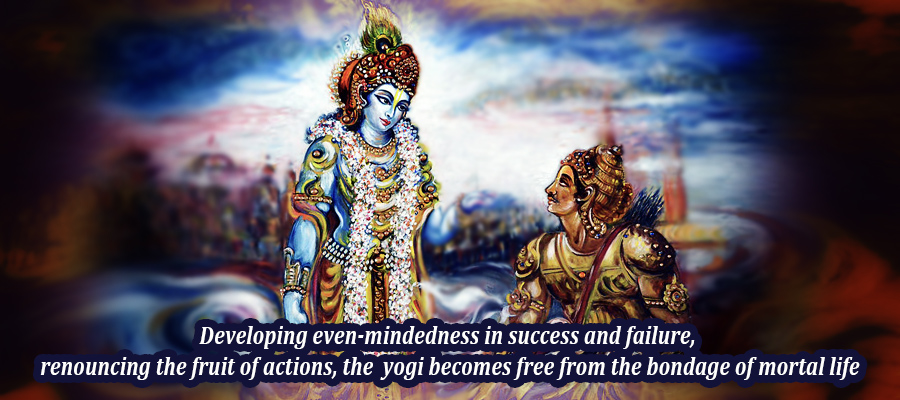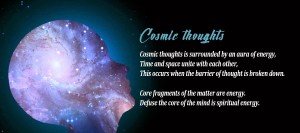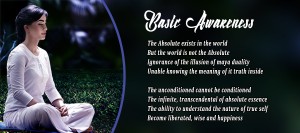Buddhi Yoga thus permits one to know ‘That by which, being known, everything, by the same token, knows n’. But this knowledge of the Totality can only be there if the de-personalization of the individual has been achieved completely. The waking state, symbolized by the Virat Purusha (the cosmic, universal Man), will then be grasped intuitively as an integral whole, assuming the significance which it should have when no longer interpreted from the limited point of view of the individual: It will appear as Conscious-ness in its totality, including the subtle world (Hiranyagarbha) as well as the non-manifested (avyakta).
The study of the three states permits one to obtain this comprehension of the manifested and the non-manifested. It will be noted, however, that the very impulse leading us to undertake this study and to carry it to its conclusion, is a gift that is bestowed on us. It is not normally within the human possibilities to obtain the cosmic vision. In the Gita Sri Krishna says that this vision may only be obtained by the grace of God, while St. John of the Cross speaks of an ‘in-fused’ contemplation. Indeed, it is a divine gift, a mystical experience.
The experience by itself, however, would not suffice, if the buddhi would not step in to interpret the data. In the 11th chapter, we find Arjuna receiving this highest gift which the cosmic vision is, but he is unable to support the intensity of it, he is unable to interpret this vision correctly. And, although God seems to have given him everything, Arjuna thus finds himself powerless to resolve the most acute, the most essential of problems: that of his own liberation. This is because the relationship between man and God—whether this relationship be sweet or strict—always remains on a personal level. The personal God appears under two aspects: On the one hand, there is the historical God, Krishna, the son of Yashoda, whom Arjuna appeals to, terrified as he is by the cosmic vision (11.46): This is the divine incarnation (avatâra).
The other aspect of the personal God is the one which Arjuna beheld in the cosmic vision itself and which constitutes the Saguna Brahman. In Indian thought, there is no conflict between the notions of avatâra (divine incarnation), Saguna Brahman (Brahman with qualities), and Nirguna Brah-man (Brahman without qualities). The ultimate comprehension can only be attained by the realization of the impersonal God, the Nirguna Brahman.
According to Shankara, the experience is of no value unless it is explained by the buddhi. An inquiry (vichâra) is needed in order to determine the nature of the experiences that we have—experiences of the manifested state (dreams, visions—authentic or hallucinatory), and experiences of the non-manifested (deep sleep, loss of consciousness), all of which assume their significance only after having been interpreted by the buddhi. As a matter of fact, if Krishna would have considered the cosmic vision accorded to Arjuna to be sufficient and final, the Gita would have ended with the 11th chapter. But Sri Krishna thought it necessary to devote seven more discourses to the instruction of His disciple, and it is only with the last chapter that Arjuna will say: ‘My delusion, my error has gone; I have regained my memory’ (18.73). This disappearing of the delusion, this restoring of the memory is the work of the higher buddhi.
Numerous seekers on the spiritual path entertain a great desire for religious experiences and then, just like Arjuna, they find themselves bewildered and in confusion that will be so much bigger as the experience (such as visions etc.) has been out of the ordinary. Such confusion may lead to the destruction of the buddhi (buddhi-nâsha) and, ‘when this destruction comes about, man perishes’ (2.63). Only a dhira buddhi, a man of superior intelligence (as opposed to a manda buddhi, a lower intelligence) can interpret correctly all that happens to him. If we are seeking experiences with-out examining their true nature, our anxiety will only increase.
When Sri Krishna showed Arjuna the Lord to be all (XI,13-40), Arjuna remained outside of this ‘all’. If he would have been able to integrate himself into this ‘all’ with the help of the buddhi, he would have obtained peace of mind. What Krishna had told him in the 10th chapter, ‘Among the Pandavas I am Arjuna,’ he did not grasp, until he had ‘regained his memory (18th chapter)’, until the higher buddhi had been awakened in him.
The object of the Vedantic discipline is to continually remind us of the primordial role which this buddhi should play in our lives. As long as a reality or a concept remains outside the buddhi which is trying to assimilate what appears foreign to it, we remain on the plane of duality: In that case, we are only dealing with an exercise of the lower buddhi. But the knowledge which the higher buddhi yields is immediate, without any intellectual processing. In fact, this buddhi em-braces all things, it alone exists. This is the reason why the Scriptures tell us that the knower of Brahman ‘actually be-comes Brahman’ (Gita, 13.30; Mundaka Upanishad, III.2.9). The terms buddhi, Brahman and Absolute are thus interchangeable.





